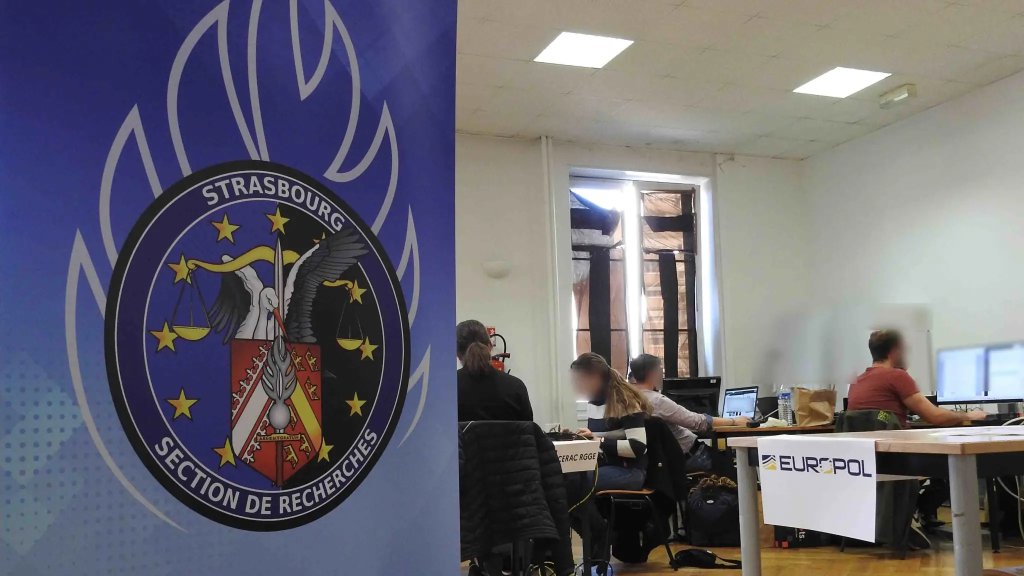The European police agency Europol has announced that with the support of the French Gendarmerie and the Italian Federal Police, it has dismantled a cross-national criminal gang suspected of smuggling migrants into the EU along the so-called 'Balkan route.'
Europol stated that around 300 gendarmerie officials in France and an unspecified number of federal police in Italy carried out a coordinated operation on April 01, which resulted in a total of 24 arrests of suspected migrant smugglers in both countries, France and Italy.
Authorities searched 24 properties for evidence and seized three vehicles linked to the case as well as a number of communication devices.
The Europol operation was also aided by authorities in Croatia, Greece, Hungary, Italy, and Serbia, according to a Europol press release. Europol itself says it facilitated the exchange of information and provided operational coordination and analytical support during the investigation, and also deployed an expert to France to "facilitate the real-time exchange of information and cross-check operational information against Europol's databases, providing leads to investigators in the field."
Read AlsoInternational trafficking ring that brought 3,000 migrants to Italy dismantled
A complex network designed to stay undetected
The leaders of the suspected criminal group were based in yet another EU country, Europol said without sharing further details. They are believed to have coordinated the smuggling of migrants via the Balkans region with the help of two French nationals in the Alsace region.
These French contacts were in charge of recruiting drivers in and around Strasbourg, the capital of Alsace, as well as in Paris to move migrants from one location to the next, according to Europol.
These drivers would be provided rental vehicles by the criminal group to pick up migrants smuggled by associates of the gang to the EU's outer border — particularly Serbia — and then bring them into the bloc.

However, the European police agency also highlighted the inner dealings of the gang, explaining that this part of the network was only allegedly in charge of one segment of the transportation and logistics, describing this as a tactic designed "to limit the threat to the entire network in cases where some members are arrested by law enforcement authorities."
Europol further explained that these drivers would often drop the migrants off in EU states close to Serbia such as Hungary, Slovenia or Austria, from where another smuggling organization would reportedly take over.
Read AlsoSerbia reports sharp decline in irregular entries
40 drivers identified
Over 40 such drivers were identified as part of the investigation to date. Although their participation in the scheme can't be classified as being at the organizational level of migrant smuggling, they, too, might face prosecution.
Europol highlights that during the transportation of the migrants across EU border, these drivers would routinely overload the backs of the vehicles, creating major health and safety hazards.
The drivers were reportedly paid up to 12,000 euros per journey, if they managed to move more than 30 migrants at a time, and would have to send a recorded video of their missions being accomplished to receive the payment.
From a legal perspective, these videos can be used as proof that the drivers were willing and knowing participants in the criminal scheme, stated Europol.
Read AlsoEU officials fight human-smuggling from Vietnam
Raids two years in the making
The Europol operation was over two years in the making. In late 2022 the Gendarmerie in Strasbourg first started looking into reports of a criminal organization with a local chapter allegedly aiding in the smuggling of migrants into the EU from Serbia.
It found that while the gang was mostly operating at major EU borders, serving as facilitators at entry points into the bloc — particularly the Serbian-Hungarian and also the Greek-Turkish border —, those activities were directly linked to other criminal acts taking place within the EU, led by this network, "notably at the Austrian-Hungarian and the Austrian-Croatian borders," Europol said, referring to the aforementioned drop-off points of the migrants within the European Union.
Read AlsoTwo suspected smuggling rings cracked across Europe
